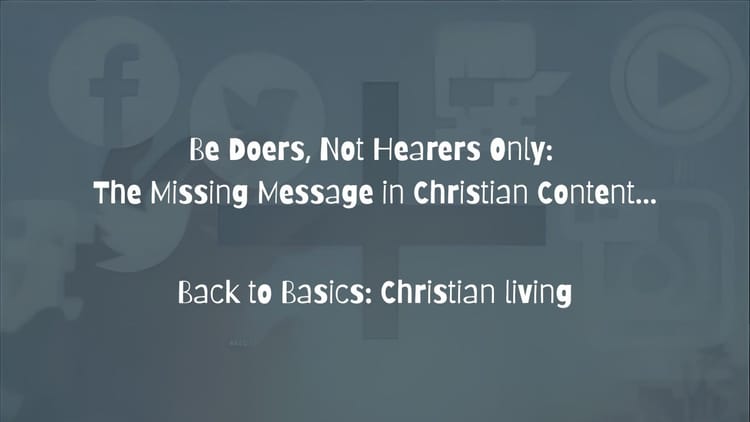God's Provision & Biblical Truth!

Understanding God's Provision…
In today's Christian landscape, we often encounter teachings that can misrepresent God's character and His provision for His people.
Recently, I came across a YouTube video entitled: God Isolates Chosen Ones from Prosperity for a Reason.
Suggesting that God deliberately keeps His chosen ones from prosperity. This prompted me to examine what Scripture teaches about God's provision and His desire for His children's well-being. Let's explore this important topic through the lens of biblical truth…
Dispelling Myths & Embracing Biblical Promises…
There is a concerning trend in modern Christian teaching that suggests God deliberately keeps His chosen ones from prosperity. This doctrine not only misrepresents God's character but also contradicts the clear teachings of Scripture regarding God's desire to provide for His children.
First, we must understand that God is our loving Heavenly Father who delights in caring for His children. Jesus himself taught about God's provision, saying, "If ye then, being evil, know how to give good gifts unto your children, how much more shall your Father which is in heaven give good things to them that ask him?" (Matthew 7:11 KJV)
The apostle Paul affirms God's provision in Philippians 4:19 (KJV): "But my God shall supply all your need according to his riches in glory by Christ Jesus." This promise is not conditional on God isolating us from prosperity; rather, it's based on His faithful character and abundant resources.
Some misguided teachings twist Scriptures to suggest that poverty equals spirituality. However, 3 John 1:2 (KJV) reveals God's heart: "Beloved, I wish above all things that thou mayest prosper and be in health, even as thy soul prospereth." This shows that material well-being and spiritual health can coexist.
The idea that God deliberately keeps His people from prosperity often stems from misinterpreting Old Testament passages or taking verses out of context. While we can learn from the Old Testament, as Christians, we live under the New Covenant. As Paul writes, "For ye know the grace of our Lord Jesus Christ, that, though he was rich, yet for your sakes he became poor, that ye through his poverty might be rich" (2 Corinthians 8:9 KJV).
It's crucial to understand that walking in God's ways won't guarantee material wealth, but it does ensure His provision. Jesus taught, "But seek ye first the kingdom of God, and his righteousness; and all these things shall be added unto you" (Matthew 6:33 KJV). The focus should be on seeking God's kingdom, not on either pursuing or avoiding prosperity.
When believers struggle financially, it's not necessarily because they're outside God's will or because God is deliberately keeping them from prosperity. Several factors can influence our financial situation, including:
- Temporary times of testing (James 1:2-4 KJV)
- Learning to trust God's timing (Ecclesiastes 3:1 KJV)
- Development of character (Romans 5:3-5 KJV)
- Economic conditions beyond our control
The Bible teaches us to be good stewards of whatever God provides: "Moreover it is required in stewards, that a man be found faithful" (1 Corinthians 4:2 KJV). This applies whether we have much or little.
Rather than embracing false teachings about God deliberately keeping His people from prosperity, we should focus on:
- Trusting God's provision: "Cast thy burden upon the LORD, and he shall sustain thee" (Psalm 55:22 KJV)
- Being content in all circumstances: "I have learned, in whatsoever state I am, therewith to be content" (Philippians 4:11 KJV)
- Walking in faith and obedience: "But without faith it is impossible to please him" (Hebrews 11:6 KJV)
- Using resources wisely for God's kingdom: "Every man according as he purposeth in his heart, so let him give" (2 Corinthians 9:7 KJV)
The truth is that God's relationship with His children isn't defined by their financial status. He promises to meet our needs, not necessarily our wants, and His provision may look different for each person. As Paul testified, "I know both how to be abased, and I know how to abound" (Philippians 4:12 KJV).
We must reject teachings that portray God as deliberately withholding good things from His children. Such doctrines contradict the nature of our loving Heavenly Father and the clear teachings of Scripture. Instead, we should trust in God's faithful provision while seeking His kingdom first, knowing that He cares for us and will supply all our needs according to His perfect wisdom and timing.
Remember, "Every good gift and every perfect gift is from above, and cometh down from the father of lights, with whom is no variableness, neither shadow of turning" (James 1:17 KJV). God's character is consistent - He is a good Father who provides for His children, not one who arbitrarily withholds prosperity for some mysterious purpose…
Why Many Modern Preachers Focus on Old Testament Teaching - A Critical Note!
It's concerning that many modern preachers teach from an Old Testament perspective, often misrepresenting God's current relationship with His people under the New Covenant. This approach fails to recognise the transformative work of Christ and the new relationship we have as sons of God "For ye are all the children of God by faith in Christ Jesus" - (Galatians 3:26 KJV).
The New Testament clearly establishes that we now live under a better covenant: "But now hath he obtained a more excellent ministry, by how much also he is the mediator of a better covenant, which was established upon better promises" - (Hebrews 8:6 KJV). Jesus Christ has become our High Priest and mediator of this new covenant: "For there is one God, and one mediator between God and men, the man Christ Jesus" (1 Timothy 2:5 KJV).
When preachers exclusively focus on Old Testament principles without properly contextualising them through the lens of Christ's finished work, they risk promoting a relationship with God based on law rather than grace "For the law was given by Moses, but grace and truth came by Jesus Christ" (John 1:17 KJV).
As born-again believers, we are now part of Christ's church, with Jesus as our head "And he is the head of the body, the church: who is the beginning, the firstborn from the dead; that in all things he might have the prominence" - (Colossians 1:18 KJV). This new position grants us direct access to the Father through Christ: "Having therefore, brethren, boldness to enter into the holiest by the blood of Jesus" (Hebrews 10:19 KJV).
Modern teaching must emphasize our position as new creatures in Christ "Therefore if any man be in Christ, he is a new creature: old things are passed away; behold, all things are become new" - (2 Corinthians 5:17 KJV), operating under the guidance of the Holy Spirit rather than the constraints of Old Testament law…
Key Takeaways:
- God is a loving Father who desires to provide for His children, not one who deliberately withholds prosperity
- Biblical promises affirm God's provision through verses like Philippians 4:19 KJV and Matthew 7:11 KJV
- Material prosperity and spiritual health can coexist, as shown in 3 John 1:2 KJV
- We should seek God's kingdom first, trusting that He will provide what we need, Matthew 6:33 KJV
- Financial struggles may have various causes and are not necessarily signs of God's disfavour
- As New Covenant believers, we relate to God through grace, not law, with direct access through Christ
- Modern teaching should emphasise our position as new creatures in Christ, operating under the Holy Spirit's guidance





